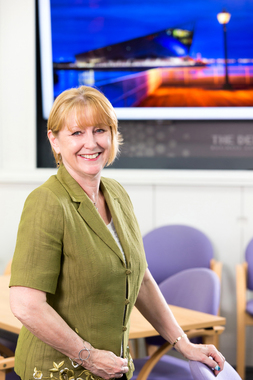New tenants and expansions take The Deep Business Centre towards capacity

Freya Cross at The Deep Business Centre.
NEW arrivals and expansion of existing tenants is taking one of the region’s leading business centre close to capacity compared to a national scenario of falling occupancy levels.
The Deep Business Centre is heading for an occupancy level of 98 per cent as incoming businesses complete their moves and long-term tenants take more space.
The figure compares with an average occupancy of 76 per cent nationally and 72 per cent in the Yorkshire and Humber region as identified in the latest report from the Business Centre Association (BCA).
Freya Cross, Business and Corporate Manager at The Deep and a board member of the BCA, said the success is down to maintaining good quality facilities and the highest standards of customer care in an increasingly competitive market.
She said: “I am delighted that we consistently perform ahead of the figures outlined for the rest of our industry in the BCA report. It’s particularly pleasing that during the period analysed by the last two reports – 2014 and 2016 – we have maintained a strong performance despite losing an anchor tenant in each year.
“Nationally, the occupancy rate fell from 80 per cent in 2014 to 76 per cent in 2016. Our level also dropped, from 83 per cent to 79 per cent, maintaining our position as a leading performer. The changes in the coming weeks will take us up to 98 per cent.”
The Deep Business Centre offers 30,000 square feet of space, with just over 25,000 available for lease or rent on terms ranging from desks or pods to large suites and work areas. The centre houses more than 40 businesses employing over 200 people, and the largest occupy around 4,000 square feet.
The BCA report estimates the total number of UK business centres to be around 2,500, of which 1,200 are operated by BCA members. The latest survey covered 23 per cent of the total market and 48 per cent of the membership.
Jennifer Brooke, Executive Director BCA, said 2015 was a year of major growth for her industry but was followed by a year of uncertainty.
She said: “Flexible space providers entered 2016 in good shape and the survey shows that the sector continued to grow and thrive amongst the uncertainty created by political events.
“While there was unquestionably some hesitation among customers and operators during 2016, the sector rebounded quite quickly. Some operators actually benefited from Brexit as providers of short-term solutions.
“The period from now until the point when the UK actually leaves the EU will bring fresh challenges but flexible space operators remain confident about their ability to face those challenges and take the opportunities that they present.”
Freya said The Deep Business Centre has not experienced a significant impact from Brexit one way or the other. The two major departures were for different reasons – a state department which had to relocate when government premises became available and a company which had to cut back because of the downturn in the oil and gas sector.
Freya said: “In many ways our experience reflects the findings of the report. There is increasing demand for space, particularly from rising numbers of self-employed people and new small businesses, and their requirements are based around high quality space and excellent technology.
“These are among the facilities in which we have invested heavily. Another is the lounge area which we opened nearly two years ago – demand now is for more communal and break-out space, and we were well ahead of that.
“The survey found evidence that companies are staying for longer in business centres, and that’s something we have seen. One of the tenants which is expanding this year celebrated 10 years with us a year ago.
“Where we do differ significantly is with the business failure rate. Nationally, the BCA finds the failure rate increasing from nine per cent in 2014 to 13 per cent in 2016. Our business failure rate has never climbed above five per cent, and that is due in part to our experience and the quality of support that we provide.”























